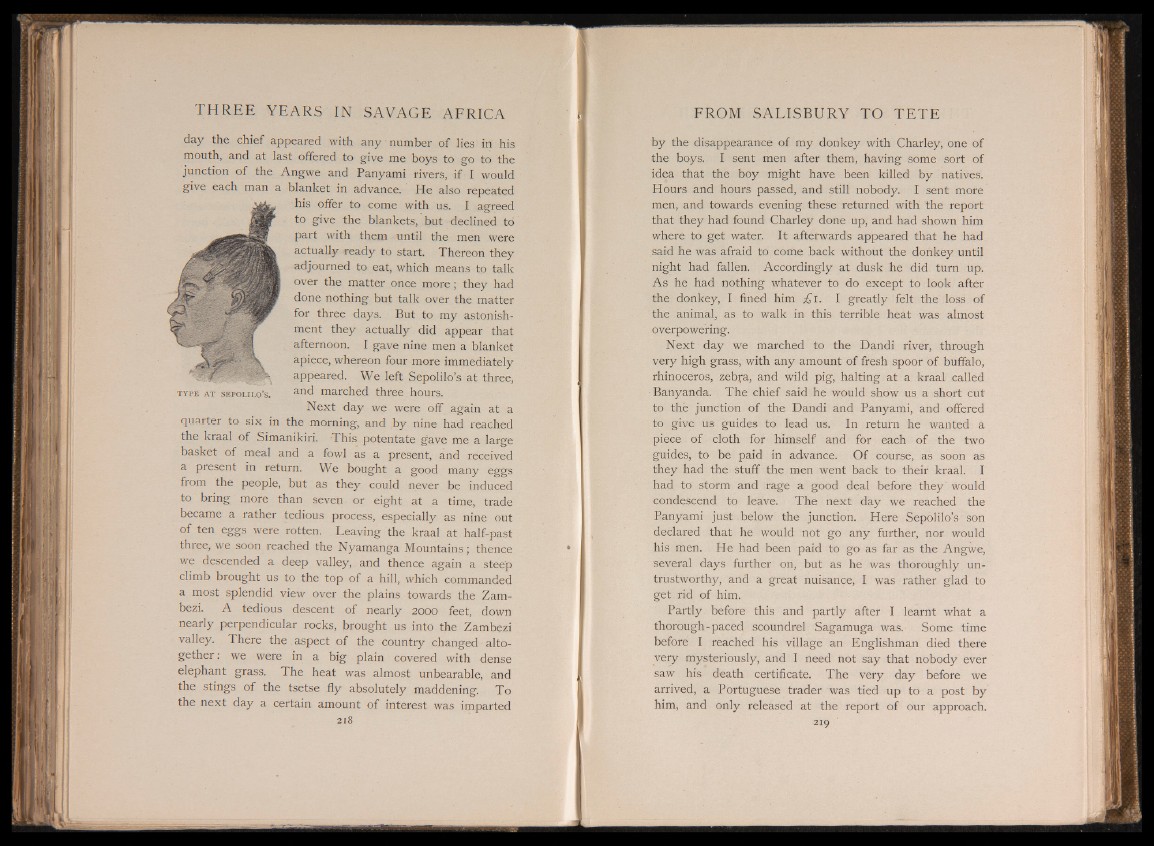
day the chief appeared with any number of lies in his
mouth, and at last offered to give me boys to go to the
junction of the Angwe and Panyami rivers, if I would
give each man a blanket in advance. He also repeated
his offer to come with us. I agreed
to give the blankets, but declined to
part with them until the men were
actually ready to start. Thereon they
adjourned to eat, which means to talk
over the matter once more; they had
done nothing but talk over the matter
for three days. But to my astonishment
they actually did appear that
afternoon. I gave nine men a blanket
apiece, whereon four more immediately
appeared. We left Sepolilo’s at three,
t y p e a t s e p o l i l o ’s . and marched three hours.
Next day we were off again at a
quarter to six in the morning, and by nine had reached
the kraal of Simanikiri. This potentate gave me a large
basket of meal and a fowl as a present, and received
a present in return. We bought a good many eggs
from the people, but as they could never be induced
to bring more than sevep or eight at a time, trade
became a rather tedious process, especially as nine out
of ten eggs were rotten. Leaving the kraal at half-past
three, we soon reached the Nyamanga Mountains; thence
we descended a deep valley, and thence again a steep
climb brought us to the top of a hill, which commanded
a most splendid view over the plains towards the Zambezi.
A tedious descent of nearly 2000 feet, down
nearly perpendicular rocks, brought us into the Zambezi
valley. There the aspect of the country changed altogether
: we were in a big plain covered with dense
elephant grass. The heat was almost unbearable, and
the stings of the tsetse fly absolutely maddening. To
the next day a certain amount of interest was imparted
by the disappearance of my donkey with Charley, one of
the boys. I sent men after them, having some sort of
idea that the boy might have been killed by natives.
Hours and hours passed, and still nobody. I sent more
men, and towards evening these returned with the report
that they had found Charley done up, and had shown him
where to get water. It afterwards appeared that he had
said he was afraid to come back without the donkey until
night had fallen. Accordingly at dusk he did turn up.
As he had nothing whatever to do except to look after
the donkey, I fined him £ 1 . I greatly felt the loss of
the animal, as to walk in this terrible heat was almost
overpowering.
Next day we marched to the Dandi river, through
very high grass, with any amount of fresh spoor of buffalo,
rhinoceros, zebra, and wild pig, halting at a kraal called
Banyanda. The chief said he would show us a short cut
to thè junction of the Dandi and Panyami, and offered
to give us guides to lead us. In return he wanted a
piece of cloth for himself and for each of the tw'o
guides, to be paid in advance. Of course, as soon as
they had the stuff the men went back to their kraal. I
had to storm and rage a good deal before they would
condescend to leave. The next day we reached the
Panyami just below the junction. Here Sepolilo’s son
declared that he would not go any further, nor would
his men. He had been paid to go as far as the Angwe,
several days further on, but as he was thoroughly untrustworthy,
and a great nuisance, I was rather glad to
get rid of him.
Partly before this and partly after I learnt what a
thorough-paced scoundrel Sagamuga was. Some time
before I reached his village an Englishman died there
very mysteriously, and I need not say that nobody ever
saw his death certificate. The very day before we
arrived, a Portuguese trader was tied up to a post by
him, and only released at the report of our approach.
2 19